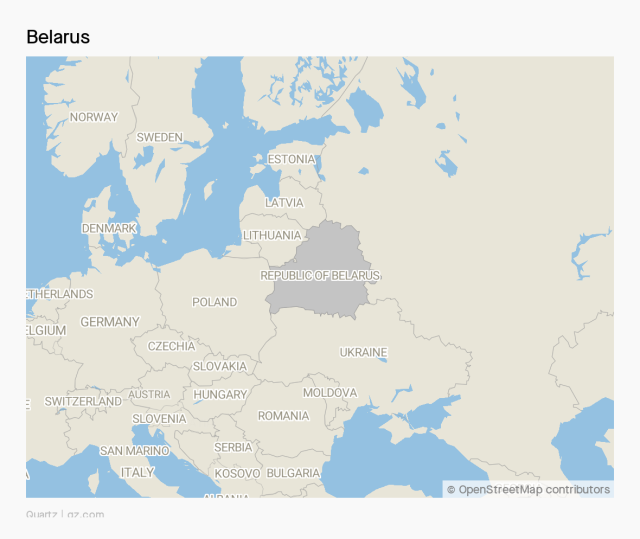Belarus is perplexed by Trump’s proposed travel ban

Two years ago, US president Donald Trump closed US borders to citizens of seven countries. Now, seven other countries across the world are rumored to be added to the list in the coming days, according to the Wall Street Journal.
Speaking to reporters on Jan. 22 at the World Economic Forum in Davos, Switzerland, Trump said he would widen what was already “a very powerful ban” to improve national security. “We’re adding a couple of countries” to the ban, he said, adding: “We have to be safe. Our country has to be safe.” He did not confirm which countries would be affected or to what extent.
A leak from administration officials to the Journal, however, revealed countries under consideration are reported to be Eritrea, Kyrgyzstan, Myanmar, Nigeria, Sudan, Tanzania—and Belarus.
At least superficially, it’s hard to see why Belarus would feature on this list, which is expected to be confirmed in the next few days. The Eastern European nation has no history of recent terror attacks and has not previously been cited as a US security risk. Unlike in many other countries targeted by Trump, Muslims make up less than 1% of the population.

Travel from Belarus to the US is already quite limited: Approximately 20,000 Belarusians received visas to travel or move to the US in 2018, according to the US State Department. More than 17,000 of these travelers were on short-term B-1/2 visas, issued to people seeking the right to travel to the US for business or tourism. It’s rare for citizens of Belarus to overstay their US visa term, with an estimated visa overstay rate of about 4%.
It’s easier to find possible explanations for many of the other countries on the list: Eritrea, Sudan, and Nigeria all have visa overstay rates of over 10%. In Kyrgyzstan, growing threats of terror may have provoked anxiety among administration officials: As of 2019, up to 800 Kyrgyz citizens had enrolled in militant groups in Syria. And in Myanmar, attacks on Rohingya Muslims since 2017 have forced more than 671,000 displaced people to flee to Bangladesh, many of whom may now be seeking asylum elsewhere.
For Belarus, the ban, if it comes to fruition, would be a surprising step, Hanna Liubakova, an investigative journalist based in Minsk, told Quartz. “We kind of all agree here in Belarus, from political analysts to journalists, that it might be a mistake,” Liubakova said. “It doesn’t seem like a planned step, so much as a kind of technical error.”
In 2006, following a presidential election widely deemed to have been rigged, the US imposed sanctions on nine of Belarus’ state-owned entities and 16 individuals (including its draconian president, Alexander Lukashenko). Since 2015, however, sanctions have been relaxed somewhat following the release of six political prisoner. More recently, there are signs the US is warming to the former Soviet state, including sending John Bolton, the former national security advisor, to visit the country in August. Mike Pompeo, the secretary of state, announced yesterday he would be traveling to the country in February. The two countries also announced plans to reintroduce ambassadors to one another’s countries for the first time in a decade. The travel ban looks like a step in the other direction, Liubakova noted. “Instead of helping the country to integrate, to warm its relationship with the West, the US is doing the opposite.”
For most Belarusians, the travel ban would have a minimal impact, Alex Kokcharov, a London-based political and economic risk analyst, told Quartz. “If Belarus is added, it would probably mean that there would be delays to visa issuance and it would take more time for application processing,” he said. “Obviously it’s not going to be very helpful to bilateral relations.” He did not anticipate much, if any, retaliation from the country toward the US.
Instead, he said, the biggest victims would be EU nationals or nationals of other countries who had visited Belarus in the past 10 years. Under the system currently in place for countries under a US travel ban, these travelers would not longer be eligible for the visa waiver system, and instead would have to apply to the US embassy for a visa to visit—a far more expensive, time-consuming process. A German who had, for example, visited Belarus for conference six years earlier would now have to apply for a visa from their local US embassy in order to enter the country.
“Certain groups of travelers such as academics, journalists, or businessmen would be disproportionately affected,” he added. “Belarus is not much of a tourist destination, so most people who travel there go out for work—business meetings, or journalistic assignments or academic conferences.” It is likely these people who would bear the brunt of a possible ban.
The Department of Homeland Security and the US State Department said they would not comment on the proposed expansion of the travel-ban list, though White House spokesman Hogan Gidley suggested that it was primarily a question of security: “While there are no new announcements at this time, common sense and national security both dictate that if a country wants to fully participate in US immigration programs, they should also comply with all security and counterterrorism measures,” Gidley said in a statement earlier this month.
Sign up for the Quartz Daily Brief, our free daily newsletter with the world’s most important and interesting news.
More stories from Quartz:
The racial dynamics between American women are flipped in a disorienting photo series
African airports and health bodies ready for China’s coronavirus’ as first suspected cases appear

